Fireball Ministry is a rock band.
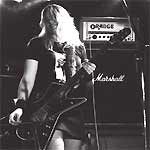 There are no trendy trappings inherent in the music—no rap metal, no thrash—simply a standard brand of heavy rock n’ roll that’s beginning to draw endless comparisons to old school stalwarts like Black Sabbath or maybe even Judas Priest. In truth, the band’s vocals do sound a bit like Ozzy-era Sabbath, but thankfully enough they aren’t done in such a way that the listener is resigned to having some kind of Kingdom Come—Led Zepplin flashback. Instead, their sound seems much more like an homage rather than an attempt to duplicate, and in fact, the aforementioned bands are all listed on the group’s website as having been influential in Fireball Ministry’s sound. Also included on this short list of seminal bands are The Ramones, Cheap Trick, Grand Funk Railroad and Venom with a special bonus points to FM for mentioning Metallica but making the important distinction that their reverence holds true for the “Cliff Burton Era” only. Ouch. I guess they didn’t like St. Anger either….or Load…or Reload…hell, I’m not even sure Metallica even resembles the group they were at this point. Anyway, let’s all hope Fireball Ministry sticks to their guns and never resigns itself to drumming muffled trashcans or covering Bob Seger. Thankfully enough, even one listen to the group’s latest, The Second Great Awakening suggests that this probably isn’t going to happen any time soon.
There are no trendy trappings inherent in the music—no rap metal, no thrash—simply a standard brand of heavy rock n’ roll that’s beginning to draw endless comparisons to old school stalwarts like Black Sabbath or maybe even Judas Priest. In truth, the band’s vocals do sound a bit like Ozzy-era Sabbath, but thankfully enough they aren’t done in such a way that the listener is resigned to having some kind of Kingdom Come—Led Zepplin flashback. Instead, their sound seems much more like an homage rather than an attempt to duplicate, and in fact, the aforementioned bands are all listed on the group’s website as having been influential in Fireball Ministry’s sound. Also included on this short list of seminal bands are The Ramones, Cheap Trick, Grand Funk Railroad and Venom with a special bonus points to FM for mentioning Metallica but making the important distinction that their reverence holds true for the “Cliff Burton Era” only. Ouch. I guess they didn’t like St. Anger either….or Load…or Reload…hell, I’m not even sure Metallica even resembles the group they were at this point. Anyway, let’s all hope Fireball Ministry sticks to their guns and never resigns itself to drumming muffled trashcans or covering Bob Seger. Thankfully enough, even one listen to the group’s latest, The Second Great Awakening suggests that this probably isn’t going to happen any time soon.
The Ministry’s first two records were both released on small indie labels. One of which, Bongload Records, is the home to many bands typically categorized as “stoner rock.” Although Fireball isn’t either a jam band or really even sludgy enough to truly be considered a member of this genre, this is nevertheless a misnomer that has managed to stick throughout the early career of this group. An increased profile though on programs like Headbanger’s Ball has done much to clarify what the collective of Rev. James Rota II, Janis Tanaka, Emily J. Burton and John Oreshnick is truly about. In the end, Fireball Ministry’s agenda is simple—rock in a way few bands do anymore. Who cares if you find yourself thinking that there is some type of discrepancy between the depiction of the group in Dan Brereton’s animated cover of the Fireball Ministry’s disc and the way they appear in real life? That’s just too bad. Face it, if you were overseeing a comic book based on your persona and appearance, you can damn well bet that every imperfection that you see when you stare bleakly into the mirror every morning would be glossed over pretty quickly as well. Yep, the arms would suddenly be bulkier, the hair thicker, the acne nonexistent and the stains that perpetually surround your lips from the Chef Boyardee that is a staple of your diet would all be washed away, and you would be instantly be transformed into “Super Ranter Dude” chasing down all the bad guys in cyberspace. You can hardly blame Fireball for embellishing a little bit.
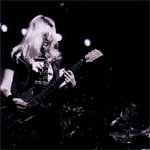 KNAC.COM: What have the conditions typically been like on this tour for you guys? I mean, you’re relative newcomers, but you have been getting a decent amount of attention lately—have you seen an upgrade in your accommodations?
KNAC.COM: What have the conditions typically been like on this tour for you guys? I mean, you’re relative newcomers, but you have been getting a decent amount of attention lately—have you seen an upgrade in your accommodations?
BURTON: Yeah, we just got a van with a trailer, so it’s like able to seat fifteen or so, so we each get our own row. It’s still a van tour, but it’s pretty comfortable.
KNAC.COM: At least it isn’t a minivan kinda tour. What’s the hardest condition you’ve ever toured under?
BURTON: I would have to say in the beginning of the band’s history. Now our drummer, John, is really good with cars. I mean he knows what to do and how to fix them, and that can help us now. When we had our first drummer though, none of us knew too much about cars, so we were in our '77 Suburban, and we went up to the Northwest. I mean, the whole trip was totally ill-fated. We got to Wyoming or something, and the car caught on fire. We eventually put the fire out, but on the way to Salt Lake City, it kept dying. Eventually, we went to the desert and lost our transmission.
KNAC.COM: Basically just one thing after another then?
BURTON: Yeah, that was the worst. We didn’t think we’d ever make it home.
KNAC.COM: At times, you had to have been like, “there’s got to be an easier way.”
BURTON: Yeah, and it was freezing cold. It was really scary too because you’re like out there kinda on your own, and we had just started out, so it’s not like you would go to these clubs and have these great guarantees or anything set.
KNAC.COM: Right.
BURTON: So we didn’t really even have any kind of tour manager, you know, you’re just kinda out there. And then you have these car problems, and you’re like, “Great! We’re gonna be stranded.”
KNAC.COM: What was the weirdest venue you ended up playing at -- a place where you just couldn’t believe you were going to be performing?
BURTON: We’ve never gone somewhere and it was like a prison, but I would say the worst one was on the same tour. It was in Salt Lake. It was our biggest guarantee on the tour, and we were really excited, but the guy called a day before to say that he was canceling the show because another band dropped out or something. So what we did was, we booked a show the day before at some kind of weird like bar, you know?
KNAC.COM: What happened?
BURTON: I don’t think they were used to having bands, but luckily the owner was cool and was just like, “I’ll buy you guys pizza, and you could just set up and play and do your thing.” At least it wasn’t a bookstore or anything.
KNAC.COM: Was it hard sometimes to even get paid? Were there people out there looking to take advantage of a group that was just starting out?
BURTON: Yeah, I mean now you go trying to book a tour, and when you book it, you get contracts signed, and you have a little more leverage, but we’ve gone to clubs -- I think it was in Cleveland -- and we got all this press and had a great show. Then, we got the contract back unsigned, and the club said they weren’t going to give us any money.
KNAC.COM: Normally, do you try to get paid up front?
BURTON: Well, usually it’s in the contract that you want get half as a guarantee. The real clubs are good about doing that. It’s real hard, you know, when you put your trust in these clubs sometimes. I’d say that we haven’t had trouble on this tour. Everyone’s really been great. We didn’t have a problem at all, but I mean we’ve had our share of getting to the clubs where people are a little shady.
KNAC.COM: This is actually your third album, but most people may not know about the other two. What’s the biggest difference as far as how people in the industry now treat you? Are they just nicer all the way around?
BURTON: Yeah, it’s much better because we have people going to bat for us, and it’s easier on the driving, too. You don’t have to get right back after the show and start driving. Like I said, we have a much better touring vehicle and trailer now. It’s all definitely easier.
KNAC.COM: When you guys first got to L.A., how did you manage to cope being new to the scene and everything?
BURTON: Well, we knew a couple of people off the Internet. Actually, it was off a stoner rock website. They were people we had never met before that.
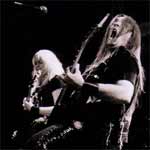 KNAC.COM: That’s pretty scary. There are some weird characters on the Internet.
KNAC.COM: That’s pretty scary. There are some weird characters on the Internet.
BURTON: Yeah. [Laughs] We didn’t know anyone else, though. We mostly met people through shows. You know, you’d just see the same people get to know them. We met people in the scene mostly just by going to the shows. People were really friendly, so it wasn’t too bad.
KNAC.COM: Were most of the bands you met willing to help by playing different bills with you—things like that?
BURTON: Yeah. Luckily, there was enough, you know, there were enough rock clubs and enough bands. I mean, you could start with playing a few clubs, and maybe you won’t get paid, but at least you don’t have to pay to play. You could have decent shows when you’re just starting out that can be pretty great.
KNAC.COM: Did you experience a decent amount of venues that expected groups to pay to play?
BURTON: I think that might have more to do with the younger people. I mean, I don’t know—we never did that. There are others that make you buy tickets to the show in order to sell them. You know, that might work if you’re younger or in high school or something, but later on you realize that you don’t need to do that.
KNAC.COM: Yeah, there’s got to be a better way. What do you think about the whole syndrome of being labeled “stoner rock”? I know Fu Manchu and Queens of the Stone Age get that a lot. What do you think about it?
BURTON: I mean personally, I like it. I don’t necessarily think our band is like that. I feel like we can play with straight ahead rock bands, metal bands or what have you. I mean, I wouldn’t really label our band as stoner rock even though I know a lot of other people do.
KNAC.COM: Yeah, it seems mostly just like straight ahead rock.
BURTON: I think that maybe it happened because of our first album being released on Bong Load. Since we have also played and toured with many of the bands who are considered stoner rock, I think it might be because of that, too.
KNAC.COM: So you think it’s more to do with association than because of the actual music?
BURTON: I think so, I mean we definitely don’t jam. I just don’t see it.
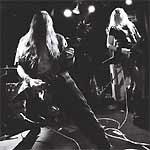 KNAC.COM: It isn’t like you guys have these huge intermissions interspersed in your songs where it’s like “ok, guitar solo time!” or anything like that.
KNAC.COM: It isn’t like you guys have these huge intermissions interspersed in your songs where it’s like “ok, guitar solo time!” or anything like that.
BURTON: Yeah, obviously we all love Black Sabbath, but it’s not like we set out to be a Sabbath cover band or anything like that.
KNAC.COM: There has been a lot said about you guys giving yourselves titles taken from the church. Is that something you just have fun with?
BURTON: We never really set out to have those names. I can’t even really remember when the whole “First Church of Rock n’ Roll” thing started. I think it was probably just one of our friends sat down one time and said that really went with Fireball Ministry. It’s nothing we take seriously. We definitely don’t want to get trapped like that’s our shtick or anything or our gimmick. I think in the end that it’s less of a gimmick than like say a theme or something... your more dramatic, fire and brimstone type stuff was just always kind of fun to me.
KNAC.COM: Isn’t that where all the best themes in metal originate anyway? Fire, brimstone, gloom and dark agony?
BURTON: Yeah, just that type of imagery. I mean, I like to think about that stuff. It’s just the whole heavy metal thing that’s larger than life.
KNAC.COM: Do you think it’s easier for your band to have females as well as males in it as opposed to a group that features only women?
BURTON: I’m not sure, to be honest, because if people come to the shows, they’re pretty much into it. I never really hear much feedback from them. I’ve never had anybody come up to me and say something negative or anything like that. So far, so good anyway.
KNAC.COM: Since you haven’t had to really deal with that problem, do you think it may be easier now than it was in the ‘80s for vocalists like Lita Ford or Doro Pesch from Warlock?
BURTON: Well, I think it’s different mostly because we don’t have a female lead singer. Maybe a female in front of a bunch of males tends to cause the band to get put in a category that we haven’t really been put into at all. Anyone who just hears our band wouldn’t have any idea that it was made by men and women.
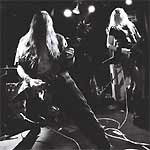 KNAC.COM: Have you found that guys seem to get a little intimidated talking to you after a show? Or do you get hit on kinda often?
KNAC.COM: Have you found that guys seem to get a little intimidated talking to you after a show? Or do you get hit on kinda often?
BURTON: Kinda. Guys will come up at times—it depends on how drunk they are. Mostly it’s just stuff like, “can I get a hug” or whatever. I never had a guy come up and be super forward or anything. Most of that type of thing comes from stuff that I read. When they come up in person though, they are really polite. No one’s crazy or anything.
KNAC.COM: What do you mean by “stuff that I read”? Are you talking about reviews or articles—things like that?
BURTON: Yeah, that and things I see in the chat rooms. Someone may say something who was at the show and claimed something happened, but never hardly said a word while they were there. Never.
KNAC.COM: How was it playing live with Danzig? Was it something you had always wanted to do?
BURTON: Yeah, we’ve played multiple times with him and it’s always been good. It was really exciting. We did a Halloween show with him last year which was really cool with it being a holiday and all.
KNAC.COM: Was it strange for you at first to see all the places like the Whisky and the Roxy and all that? The legendary venues in L.A.
BURTON: Yeah, I still get excited when I get to the Rainbow. We also played the Troubador, which was very cool.
KNAC.COM: What kind of old school L.A. characters have you ran into since being in the city?
BURTON: Hmm, one of them was Taime Downe from Faster Pussycat. He’s still around.
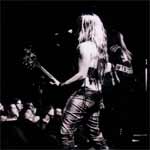 KNAC.COM: Is he strange?
KNAC.COM: Is he strange?
BURTON: He’s cool. [Laughs]
KNAC.COM: Uh, that didn’t really answer my question though…
BURTON: He’s a weirdo—yes, but I don’t really know him that well. He’s actually a great rock DJ and plays a lot of great stuff. He still has his club that he can be found in from time to time. I also ran into C.C. Deville.
KNAC.COM: Oh, no. How did that go?
BURTON: He’s just really weird.
KNAC.COM: Yep. You get that impression--the voice alone is like somebody choking on popcorn.
BURTON: I couldn’t really understand what he was saying.
KNAC.COM: He does have a tendency to speak really fast and get muffled.
BURTON: Yeah, I mean, I thought about those people all the time when I was growing up and how they were all just hanging out on the Strip. I never actually thought that when I got to LA that any of those guys would still be around. Some of them are still doing well, too. I mean, it’s not like everyone was a rock casualty--there’s still bands that are even together and out there touring and making some money. Actually, it would be nice to be around that long.




